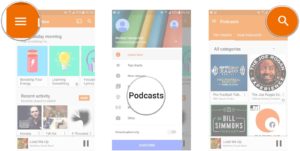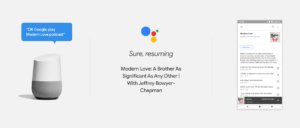We all know by now that Google search engine results have a massive impact on traffic leading to your website. When Google announced in April that they were going to be changing the way they handle podcasts, it peaked our interest at SEO Sydney immediately. We already know that audio search and personal assistant devices such as the Google Home and Amazon Echo are affecting the way we find information, and this could once again revolutionise things. It was actually in a podcast that we first began to hear about these changes, funnily enough. However, now we have dug deeper and can bring you more insight into Google’s plan for podcasts.
What Has Already Happened
The change begins with android phones, where a google search essentially mimics a podcast app. The search will be able to not only display podcasts, but also individual episodes, as well as descriptions. You’re also able to use this to listen to podcasts, and create a personal podcast ‘base’. This is where suggestions based on personal preference will be shown.
Until now Google has been significantly behind Apple in this area, due to iOS having a dedicated podcast app. Whereas until now, android users have had to search for podcasts in the google play store. In just a short time since the launch of this feature, Google has seen the results and how their audience are learning to understand podcasts and their features. While Google has not yet produced an app for podcasts alone, the ‘homebase’ allows for user-friendly experience. Google can see podcasts potential, and are only planning to expand on that even more in the future.
Google’s Plan For The Future
This is only part one of Google’s plan to double the number of podcast listeners in the next few years. Previously when searching using Google, text links were the main ones to show up. A recent change allows more videos to be displayed. However, now Google wants to make podcasts a ‘first-class-citizen’ and have them show up for search queries.
Significant changes will be rolling out over the next few months and years, but thankfully Google is sharing their plans and keeping us informed. If you want to be one step ahead of the game, being aware of the changes and future plans is crucial.
AI Transcription
Included in their announcement is Google’s claim that soon they will have the ability to “transcribe the podcast and use that to understand more details about the podcast, including when they are discussing different topics in the episode”.
This means that information shared in podcasts will be accessed by more than just their regular audiences. Snippets of the podcast will be able to answer individual questions, even if that question was only 2 minutes of an hour long podcast. Google is picturing a future where you can use voice search through a personal assistant device, and a podcast can start playing right from where that question is answered. Now if that isn’t something to get excited about, we don’t know what is!
In (hopefully) the near future, Google will also be introducing a feature known as “lookahead scrubbing” where you can preview what the podcast will be discussing if you just ahead, via text. This style is similar to previewing on YouTube and allows for better user interaction. There is also talk of translation features that will allow the creator to automatically publish a podcast in every language. Although we’re not quite that far along, its crucial to think about how this could affect your podcast’s SEO when this is implemented.
Implications for SEO
So what does this mean for SEO? It can be easy to look at this and just think it was relevant for existing podcasts, but we see an SEO opportunity for all websites. Now, when people are searching with text, we are aiming to have text posts that link to what people who are searching in order to bring them to your website. In the future when voice search is taking over, you will need to aim to have a podcast that addresses their search and brings them to the site.
You will also need to weary of keyword research and how that can play a part in the SEO of a podcast. When Google is able to present podcasts as a ‘first-class-citizen’ in search queries, keywords will play a large part in how your site ranks on Google. Once having determined the keywords you’re trying to rank for, you will need to incorporate them into your podcast as organically as possible. This in turn will drive more traffic to your page. To do so of course, you must be up to date with keyword research and what it entails.
We know that text information can answer voice search and vice-versa. However, with Google’s prioritization of podcasts and voice search changing, you may begin to fall behind.
Even if you continue solely with text-based content, this needs to be adapted to prioritize voice search. This means understanding the way people tend to speak when using voice search. It can be pretty different from the way we have learnt how to text search. With that being said, we’ve already seen the power of Google Assistant and the technology in place to comprehend human voices. While Google has been making strides in this space, you must not forget or ignore your keywords, as all forms of SEO remain important.
How To Get Your Podcast To Show
Getting your Podcast seen and ranking high on Google is a whole new ball game when it comes to SEO. There are a few things you need to consider when thinking about how your podcast will rank and what you can do to keep it on top. Aside from the basic guidelines that Google provides, there are a few things you may want to keep in mind when posting and creating podcasts.
1. What’s the difference between Android and iOS users?
Think about how Android and iOS users differ in terms of the content they may be searching for and how they search. Do their search patterns differ when it comes to your keywords? And if they do, what do you need to do in order to change the way you optimise your podcast? In 2017 iPhone users spent nearly triple the amount on average than an Android user when visiting an ecommerce site. Luckily, if you’re focusing on the Android user, you can use certain social media platforms to your advantage. For example, Facebook Ads manager will allow you to target “Android Devices Only” if you wish to do so. That’s definitely something to consider when choosing and working with your core demographic. There are also many other steps you can take to increase your conversion rate and further develop your SEO.
2. What are other podcasts in your space doing right?
Take a look at the podcasts you currently listen to, as well as ones that are thriving in your space. Evaluate what they’re doing right and follow their lead when it comes to their marketing strategy. Don’t know where to start? Listen to our favourites and pick up a few helpful hints along the way. Who knows what you may learn about Audio SEO!
3. In what context is the user listening?
Google provides services to users based on what context they’re in. So if you’re using a laptop, vs a mobile phone or wifi vs cellular network, the experience will vary, based on a multitude of reasons. In order to increase user reach with your podcasts you need to consider how the listener is accessing the content. Are they listening to it while driving, at the gym with headphones in, or perhaps out loud on a speaker? By thinking about the context in which someone will listen to your podcasts and asking what content is best for the context your audience will be listening, you’ll be able to optimise your content. It’s also worthwhile to assess how the device interoperability will change the behaviour of your users. This ensures you know what works with your listeners and what more people will be willing to engage with.
How to prepare for what’s to come
The new changes we’ve heard about with Google is just the beginning. The ever-increasing need for audio content and to optimise your site for audio searches, combined with Google’s new changes will mean you need to shift the way you think about SEO. While there are some new factors that need to be considered, it also introduces new opportunities to optimise your platform through Audio SEO and the content coming from your podcasts. We couldn’t be more thrilled about the endless possibilities podcasts are and will continue to present in the future!
If you enjoyed this article. check out SEO Sydney – the experts in all things SEO today!







